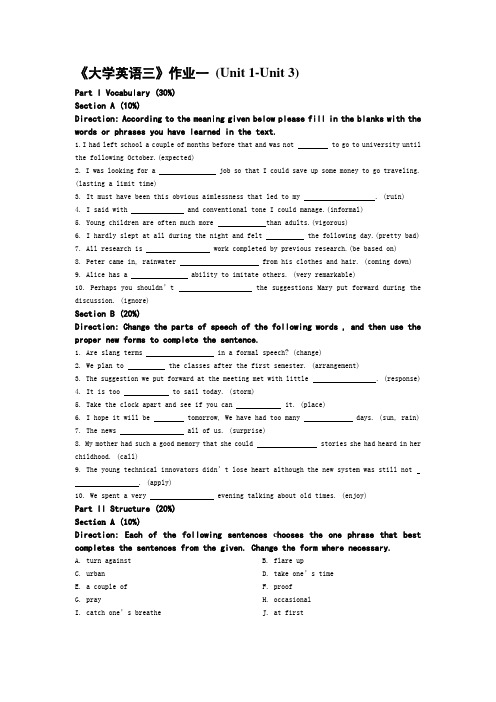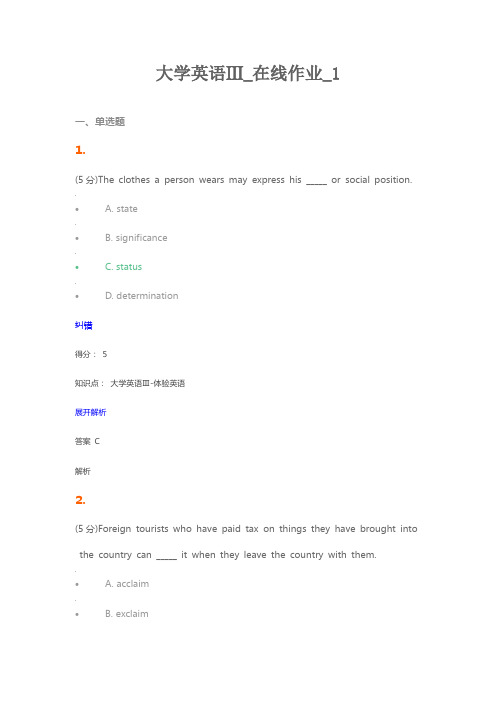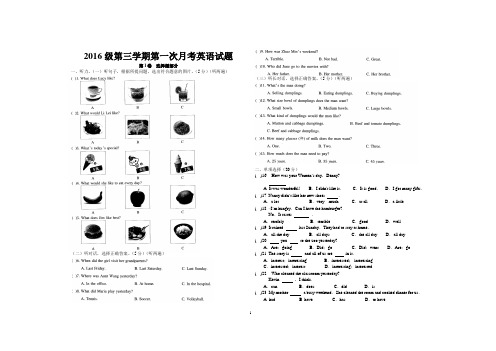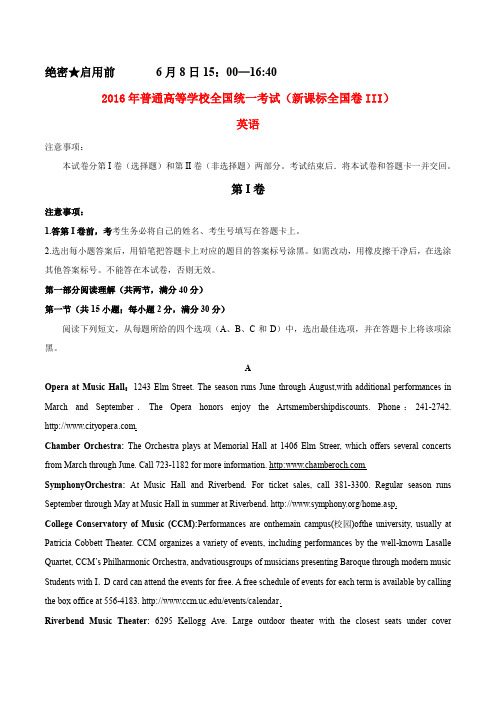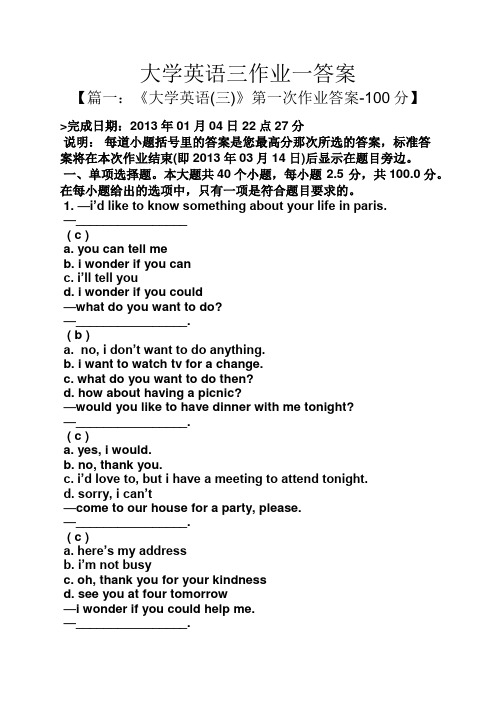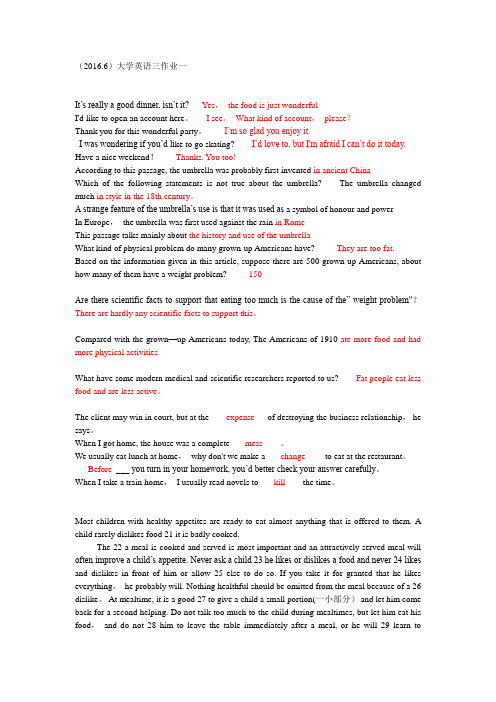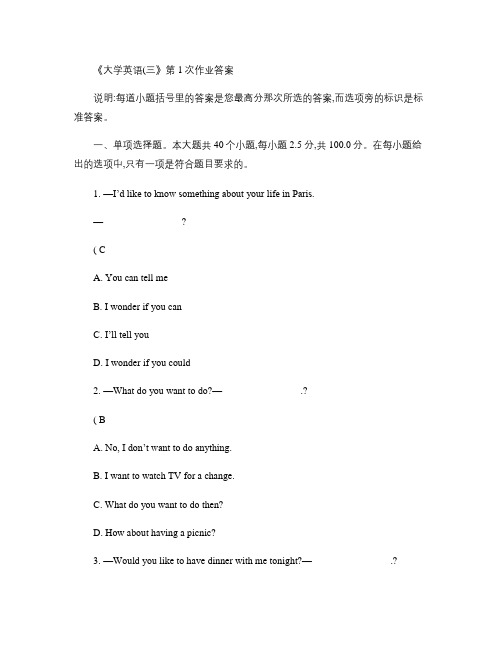《大学英语三》作业一(Unit 1-Unit 3)Part I Vocabulary (30%)Section A (10%)Direction: According to the meaning given below please fill in the blanks with the words or phrases you have learned in the text.1.I had left school a couple of months before that and was not to go to university until the following October.(expected)2. I was looking for a job so that I could save up some money to go traveling. (lasting a limit time)3. It must have been this obvious aimlessness that led to my . (ruin)4. I said with and conventional tone I could manage.(informal)5. Young children are often much more than adults.(vigorous)6. I hardly slept at all during the night and felt the following day.(pretty bad)7. All research is work completed by previous research.(be based on)8. Peter came in, rainwater from his clothes and hair. (coming down)9. Alice has a ability to imitate others. (very remarkable)10. Perhaps you shouldn’t the suggestions Mary put forward during the discussion. (ignore)Section B (20%)Direction: Change the parts of speech of the following words , and then use the proper new forms to complete the sentence.1. Are slang terms in a formal speech? (change)2. We plan to the classes after the first semester. (arrangement)3. The suggestion we put forward at the meeting met with little . (response)4. It is too to sail today. (storm)5. Take the clock apart and see if you can it. (place)6. I hope it will be tomorrow, We have had too many days. (sun, rain)7. The news all of us. (surprise)8. My mother had such a good memory that she could stories she had heard in her childhood. (call)9. The young technical innovators didn’t lose heart although the new system was still not. (apply)10. We spent a very evening talking about old times. (enjoy)Part II Structure (20%)Section A (10%)Direction: Each of the following sentences c hooses the one phrase that best completes the sentences from the given. Change the form where necessary.A. turn againstB. flare upC. urbanD. take one’s timeE. a couple ofF. proofG. pray H. occasionalI. catch one’s breathe J. at first1. Mr. Price defeat in running against Mr. Johnson in the last election.2. the monitor was reluctant, but then he changed his mind and became very cooperative.3. It was very clever of her to his argument himself.4. I found shoes under the bed but they don’t make a pair.5. To obtain the job, you must have of residence in Michigan, such as a Michigan ID card.6. In terms of population, Greater New York City is the largest center in the United States.7. The tired traveler stopped to and make sure of his directions.8. The drinking of liquor is much less harmful than habitual use.9. Dr. Bright always as he examines his patients and treats them with extreme care.10. Now all we can do is help ourselves and to God.Section B (10%)Direction: Rewrite the sentence by using the given word.1. Attitudes towards daydreaming are changing.Attitudes towards night dreaming have changed.(as)2. I teach not because teaching is easy for me. (don’t because)3. It so happened that his methods didn’t work at all.(It turns out that …)4. If he were ill, he would not have come.(or)5. The boy has defeated many grow-ups at chess.He is only eleven.(although)Part III Reading Comprehension (30%)Direction: In this part there are three passages followed by questions, each with four suggested answers. Choose the one you think is the best answer.Passage 1Have you ever been afraid to talk back when you were treated unfairly? Have you ever bought something just because the salesman talked you into it? Are you afraid to ask someone for a date? Many people are afraid to assert themselves. Dr. Alberti, author of “Stand Up, Speak Out, and Talk Back”, thinks it’s because their self-respect is low. “Our whole set-up is designed to make people distrust themselves,” says Alberti. “There ‘s always a ‘superior’ around: a parent, a teacher, a boss who ‘knows better.’ These superiors often gain when they chip away at your self-image.”But Alberti and other scientists are doing something to help assert themselves. They offer “assertiveness training” courses-—AT for short. In the AT course people learn that they have a right to be themselves. They learn to speak out and feel good about doing so. They learn to be aggressive without hurting other people.In one way, learning to speak out is to overcome fear. A group taking an AT course will help the timid person to lose his fear. But AT uses an even stronger motive—the need to share. The timid person speaks out in the group because he wants to tell how he feels.Whether or not you speak up for yourself depends on your self-image. If someone you face is more “important” than you, you may feel less of a person. You start to doubt your own good sense. You go by the other person’s label. But, why should you? AT says you can get to feel good about yourself. And once you do, you can learn to speak out.1. The problem the writer talks about is that ______.A. some people buy things thy don’t wantB. some people are afraid of arguing for themselvesC. there are too many ‘superiors’ aroundD. some people think too highly of themselves2. The cause of the problem talked about in this passage is that _______.A. some people have a low self-imageB. there is always someone around who “knows better”C. salesmen talk people into buying things they don’t wantD. people don’t share enough in common3. The effect of our set-up is often to _______.A. make people distrust themselvesB. make things more favorable for “superiors”C. keep people from knowing as much as their “superiors” knowD. help people to learn to speak up for their rights4. AT is one solution to the problem in this passage. One thing AT doesn’t do is ______.A. use the need of people to shareB. show people they have a right to be themselvesC. help people overcome fearD. help people to assert themselves even if others suffer5. A good title for this passage could be _______.A. Assertiveness TrainingB. Loss of Self-respectC. The Importance of Human RightD. Share Your Feeling With OthersPassage 2Everywhere we’ve traveled we’ve been asked, “Can we achieve an advanced, high-technology economy- -- and still stay Chinese? Or Mexican? Or Russian? Must nations surrender their cultural uniqueness to the next wave of technological and social change?”If, in fact, Web-televiewers some day will be able to pick up a Brazilian variety show,a Polish newscast, a Yugoslavian cartoon and a Japanese soap opera, all translated into the local language; if fashions and foods come from several different countries and if religious ideas come in from many different parts of the would, what happens to the original culture? Can any nation keep its identity under this large amount of foreign images and ideas?Are all destined to melt into the so-called “global village” with all the same qualities and shared experience of villagers?Where economic development is still based on the export of cheap muscle labor and mass production, the answer may be “perhaps”. Low-tech mass production societies need low-tech mass media.But where economies move beyond the assembly line and the traditional manufacturing techniques to the new, knowledge-based forms of wealth creation, the answer will be a strong “no”.The Chinese can remain uniquely Chinese by choosing, from all the elements of world culture, selection of ideas, images and knowledge. The combination chosen by chian will be different from that chosen by France or Germany or the United States. In this sense, the Chinese will be totally,unmistakably Chinese----___ not France, German or American. But they will no longer be the Chinese of the past. They will be the Chinese of the future. In short, despite the near-term dominance of the producers of mass culture like Disney, the long-term future of culture is not a situation where all cultures seem the same but an immense, complex and valuable mixture of individual national traditions, fashions, and beliefs.6. What’s the main idea of this passage?A. Information technologies bring us into a “global village”.B. People from different cultures can share many things on the Internet.C. In spite of information technologies, different cultures remain different.D. People enjoy watching foreign shows and eating foreign foods.7. What can be inferred from the passage?A. The world is going to be a “global village” which all people will enjoy.B. The assembly line is one feature of low-tech mass production society.C. People would like to share the same culture all over the world.D. Web-televiewers will enable us to set up a “global village”.8. The passage implies that _________.A. technological and social change always brings about change in cultureB. culture always brings about technological and social changeC. technological and social change never brings about change in cultureD. culture never brings about technological and social change9. The passage suggests that high-tech developments bring about _________.A. more influence on culture in a developed society than in a developing oneB. less influence on culture in a developed society than in a developing oneC. as great an influence on culture in a developed society as in a developing oneD. no influence on culture at all in either a developed or a developing society10. Which of the following statements is not true according to the passage?A. IT enables people to get easy access to foreign culture.B. People in different culture have different ideas of accepting different culture.C. Disney is an example of a combination of different culture.D. There won’t be a “global village”.Passage 3Psychology is the study of the mind and mental activities. For example, psychologists are interested in why some things make you sad, but others make you happy. They want to know why some people are shy, but others are quite talkative. They also want to know why people do the things that they do. They test intelligence.Psychologists deal with the minds and behavior of people. Your mind consists of all your feelings, thoughts, and ideas. It is the result of one part of the brain called the cerebrum (大脑). Your behavior is the way you act or conduct yourself. Examples of behavior include shouting, crying, laughing and sleeping.Several people have been instrumental in the field of psychology. Whilhelm Wudt set up the first psychological laboratory in Lenpzig, Germany, in 1879. Ivan Pavlov, a Russian, is noted for his experiments with dogs in which he studied their relaxes ( 反射作用) and reactions. Around 1990, Sigmund Freud stated his theory that people try to repress any memories or thoughts that they believed were not good.Psychologists should not be confused with psychiatrists. Psychiatrists deal only with mental illness. They are medical doctors who treat people.11. A good title for this selection is .A. Studying the MindB. Feelings and Behavior of Human beingsC. Psychology and PsychiatryD. Famous Psychologists12." Some people are shy." That means .A. they are modestB. they are quietC. they never say a wordD. they are ashamed13. We may conclude that psychologists .A. study physical diseases as wellB. deal with animals more often than with peopleC. are not medical doctorsD. are interested in things that make you sad14. The cerebrum controls .A. the mindB. the bodyC. the whole brainD. the field of psychology15. Pavlov worked with _______________.A. peopleB. dogsC. mental illnessD. abnormal behaviorPart IV Translation (10%)Direction: Translate the following sentences into English.1.如果有机会, 迈克也许已成为一位杰出的画家了.2. 请务必做到不让孩子们探身窗外.3. 不少人希望有机会去国外学习,然而仅有少数人有此可能.4. 起初我以为他是在开玩笑,可后来我知道他当真了.5. 兑现支票时大多数银行要求提供身份证明.Part V Writing (10%)Direction: Write a short passage about 150 words according to the topic given below.How to Improve Your Reading Speed《大学英语三》作业二(Unit 4-Unit 5)Part I Vocabulary (30%)Section A (10%)Direction: According to the meaning given below please fill in the blanks with the words or phrases you have learned in the text.1. , young people are less conservative than old people.(usually)2. I thought I heard on the door, but it was only the wind.(a knock)3. They permission to use the auditorium for the symposium. (apply)4. I that you wouldn’t like to stay indoors if it were not raining.(suppose)5. Because her jeans fit too she didn’t feel at all comfortable.(closely)6. Every bell has its own sound. (characteristic)7. Their holiday trip was spoiled by the search for their lost passports. (painstaking)8. The constantly wind made the sailing almost impossible.(changing)9. On seeing the blanket kicked away by the little boy, she around him. (wrapped it tightly)10. At the dance, she the important letter into the officer’s hand. (secretly passed)Section B (20%)Direction: Change the parts of speech of the following words , and then use the proper new forms to complete the sentence.1. Do you have any that Charles stole the jewels. (evident)2. They looked forward to the occasion with great . (eager)3. I was to hear that Tom had failed his exam.(surprise)4. He spent a lot of time my pronunciation. (correct)5. The plane landed , (smooth)6. As neither nor labor would give in, the union organized a strike. (manage)7. I gave the TV set a thorough before I bought it. (inspect)8. Hans went to his dentist for because of a bad toothache. (consult)9. John is such a that no one likes to talk to him. (bore)10. It is very of you to invite me to sea. (kind)Part II Structure (20%)Section A (10%)Direction: Each of the following sentences c hooses the one phrase that best completes the sentences from the given.A. on endB. have sth to oneselfC. huddleD. stand in the way ofE. set one’s mindF. once in whileG. in addition to H. at a lossI. keep on J. on guard1. Once Amelia on somethi ng she wouldn’t easily give up.2. Every case he had was already with others.3. Most of the evenings we watch TV at home, but we go to a concert.4. When night fell, the boys by the fire to protect themselves from the bitter cold..5. When the World Cup Soccer Tournament was held in that country, lots of people queued up for days in order to get a ticket.6. a large collection of scientific works in Chinese, our liberty contains many scientific books in foreign languages.7.When the reporters asked him if he had any comments, he was what to say.8. While my wife and kids were away for the long weekend, I the entire house .9. Nothing can the Chinese people in their resolve to modernize their country.10. The police warned people to be against burglary during the festiveal. Section B (10%)Direction: Rewrite the sentence by using the given word.1.He has never experimented with the new methods.And he does not intend to either. (neither)2.Electromagnetic waves travel fast.Light travels also fast.(as…as)3. If more people help them, they probably will be able to accomplish the task ahead of them.(with)4.everyone, come to know him (It was not long before…)5.you, get used to, wear glasses(It won’t be long befor)Part III Reading Comprehension (30%)Direction: In this part there are three passages followed by questions, each with four suggested answers. Choose the one you think is the best answer.Passage 1I was only eight years old when the Second World War ended, but I can still remember something about the victory celebrations in the small town where I lived. We had not suffered much from the war there, though like most children of my age, I was used to seeing bombed houses in the streets and the enormous army lorries passing through. But both at home and at school I had become accustomed to the phrases "before the war" and "when the war's over". "Before the war," apparently, things had been better, though I was too young to understand why, except there had been no bombs then, and people had eaten things like ice cream and bananas, which I had only heard of. When the war was over, we would go back to London, but this meant very little to me. I did not remember what London was like.What I remember now about VE Day was the afternoon and the evening. It was a fine May day.I remember coming home about five o'clock. My father and mother came in about an hour later. After dinner I said I wanted to see the bonfire, so when it got dark my father took me to the end of the street. The bonfire was very high, and some people had collected some old clothes to dress the unmistakable figure with the moustache they had put on top of it. Just as we arrived, they set light to it, the flames rose and soon covered the "guy". Everyone was cheering and shouting, and an old woman came out of her house with two chairs and threw them on the fire to keep the fire going.I stood beside my father until the fire started to go down, not knowing what to say. He saidnothing either. He had fought in the First World War and may have been remembering the end of that. At last he said, "Well, that's it, son. Let's hope that this time it really will be the last one".1. Where did the narrator live before the Second World War?A. BrazilB. In LondonC. In EuropeD. In the countryside2. What kind of food had the narrator certainly not tasted during the war?A. BreadB. ButterC. Ice creamD. Meat3. The unmistakable figure with the moustache most probably represents .A. someone who died in the warB. someone who had wonC. an imaginary figureD. the most hated person in the war--Hitler4. The narrator's father .A. had fought in the Second World WarB. may have suffered much during the previous warC. helped build a bonfire on VE DayD. added something to the fire to keep it going too5. By saying "Let's hope that this time it really will be the last one, " the father meant that .A. he hoped there would be no more wars in the worldB. he wished the Second World War had not happenedC. he hoped people would not build any more bonfiresD. he wished people would learn many lessons from the warPassage 2The game of golf has become more popular each year. Golf players enjoy spending time on the open, grassy areas on which the game is played. Yet, several international organizations say golf courses (高尔夫球场) damage the environment.One environment group, the Worldwatch Institute, has published a report about the problems with golf courses. It says studies show that most golf courses use large amounts of chemical poison and fertilizers (化肥). The grass often grows in sandy soil which fail to absorb the chemicals. So, the chemicals pollute natural water supplies.Golf courses also require a lot of water. A study shows that one golf course in Thailand uses as much water as that needed by 6 000 people.Environmentalists also fear the expansion of golf courses will destroy natural areas. In Vietnam, the government sold a protected rainforest, Thu Duc forest near Saigon, to a golf course developer. In Laos, a Thai company recently won approval for building a golf course and a hotel in one of the country’s few remaining underdeveloped areas.The World watch Institute says golf courses are the fastest growing kind of land developmentin the world. There are about 25 000 golf courses throughout the world.Together, they already cover an area about the size of Belgium (比利时).6. The sandy soil .A. can pollute natural water suppliesB. is rather poor in absorbing chemicalsC. is the best place to build golf coursesD. can take a large amount of fertilizer7. Which of the following is NOT mentioned in the passage?A. Golf courses consume a lot of water.B. Each year many new golf courses are build.C. There is grass growing on the golf course.D. There are many golf courses in Belgium.8. We can infer from the passage that .A. golf courses already cover a large areaB. underdeveloped areas should be protectedC. the forest near Saigon is a well protected areaD. golf courses development is speeding up9. The author’s purpose in writing the passage is .A. to warn against the fast expansion of golf coursesB. to explain how to limit golf gamesC. to show how to protect the environmentD. to criticize golf course developers10. Golf courses may bring many problems EXCEPT .A. consuming much waterB. destroying natural areasC. poisoning sandy soilsD. polluting water suppliesPassage 3By adopting a few simple techniques, parents who read to their children can substantially increase their children’s language development. It’s surprising, but true. How parents talk to their children makes a difference in children ‘s language development. If a parent encourages the child to actively respond to what the parent is reading the child’s language skills increase.A study was done with two-to three-year-old children and their parents. Half of the thirty children participated in the experimental study; and half acted as the control group. In the experimental group, the parents were given a two-hour training session in which they were taught to ask open-ended questions rather than. “Is the doggie running away?” Experiment parents were also instructed in how to expand on their children’s answers, how to suggest alternative possibilities, and how to praise correct answers.At the beginning of the study, the children did not differ on measures of language development, but at the end of one mouth, the children in experimental group tested 5.5 mouths ahead of the control group on a test of verbal expression and vocabulary. Nine mouths later, the children in the experimental group still showed an advance of 6 mouths over the children in control group.11. Which of following can be inferred this passage?A. Children who talk a lot are more intelligent.B. Parents who listen to their children can teach them more.C. Active children should read more.D. Parents’ good questions help a lot in development children’s verbal ability.12. According to the author, which of the following questions is of the best type to ask children about what they are read to?A. Do you see the elephant?B. Is the elephant in the cage?C. What animals do you like?D. Shall we go to the zoo?13. What is the difference between the control group and the experimental group.A. The training parents received.B. The age of the children participating.C. The books that were read.D. the number of children participating.14. What conclusion is best supported by the passage?A. Parents must be trained to read to their children.B. The more children read, the more intelligent they become.C. Children’s language skills increase when they are required to respond actively.D. Children who read actively act six mouths older.15. At the beginning of the study, the children did not differ on measures of language development, but at the end of one months, the children in the experimental group tested 5.5 months ahead of the control group on a teat of verbal expression and vocabulary. (Translate the sentence into Chinese.)Part IV Translation (10%)Direction: Translate the following sentences into English.1. 我问了她无数次,可她拒绝回答我的问题。
